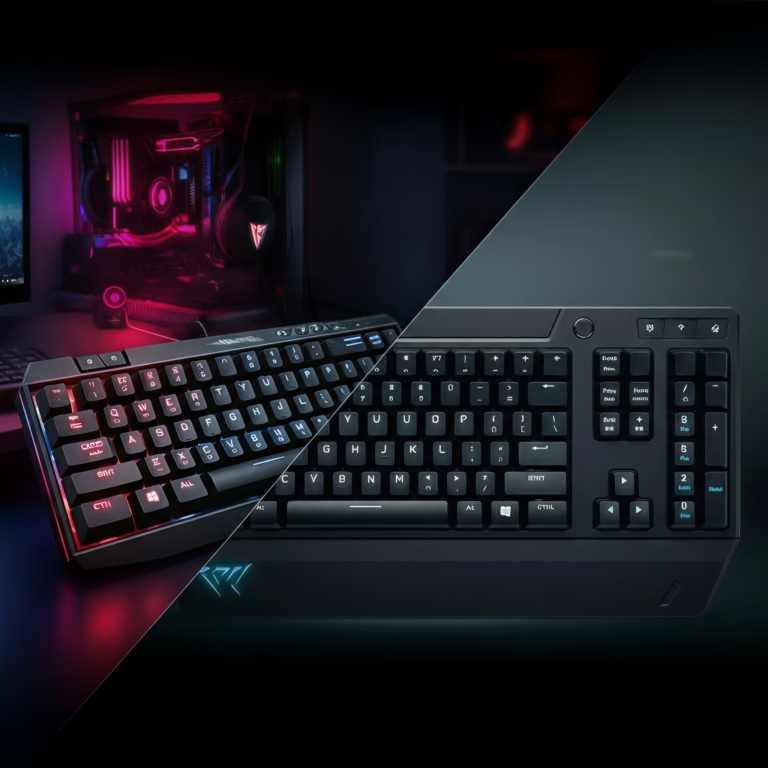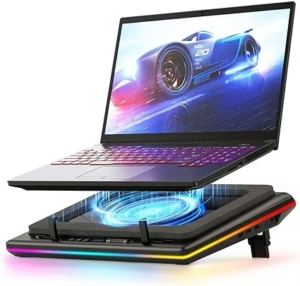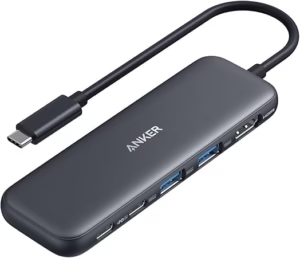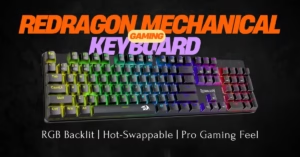Choosing the right keyboard can make or break your experience, whether you’re a competitive gamer, a busy office worker, or a dedicated tech enthusiast. A great keyboard doesn’t just make typing or gaming easier; it enhances comfort, boosts productivity, and contributes to long-term satisfaction.
For years, mechanical vs membrane keyboards have been a hot topic. Mechanical keyboards are known for their tactile feedback and durability, while membrane keyboards are lauded for their affordability and quiet operation.
This guide offers a comprehensive comparison between the two keyboard types, helping you decide which one better suits your needs and budget.
What is a Mechanical Keyboard?
A mechanical keyboard is designed with individual spring-loaded switches under each key. Each key functions independently, providing precise actuation and a satisfying tactile response.
How Do Mechanical Switches Work?

Mechanical keyboards rely on key switches that register keystrokes through physical contact. These switches often consist of plastic sliders, metal springs, and electrical contacts, offering unique typing experiences depending on the switch type.
- Cherry MX switches, such as Red (linear), Blue (clicky), and Brown (tactile), are industry standards for mechanical keyboards.
- Alternatives like Gaterons, Razer’s key switches, and Kailhs provide a variety of feels, levels of resistance, and sound profiles.
Characteristics of Mechanical Keyboards
- Tactile Feedback (satisfying to the touch).
- Audible Clicks (especially with clicky switches).
- Higher Actuation Force for precise and deliberate keypresses.
Why People Like It:
- Lasts longer: Some switches can last over 50 million keystrokes.
- Customizable: You can change keycaps or even swap switches.
- Fun to use: Many enjoy the “clicky” sound and tactile feel.
Popular Mechanical Keyboard Products:
- 🔗 Keychron K8 Wireless Mechanical Keyboard – Great for typing and has both Mac/Windows support.
- 🔗 SteelSeries Apex Pro – Ideal for gamers, with adjustable switches and RGB lighting.
A Brief History
Mechanical keyboards originated in typewriters. Over time, they developed into robust gaming and work tools, making them essential for professionals and enthusiasts alike.
What is a Membrane Keyboard?
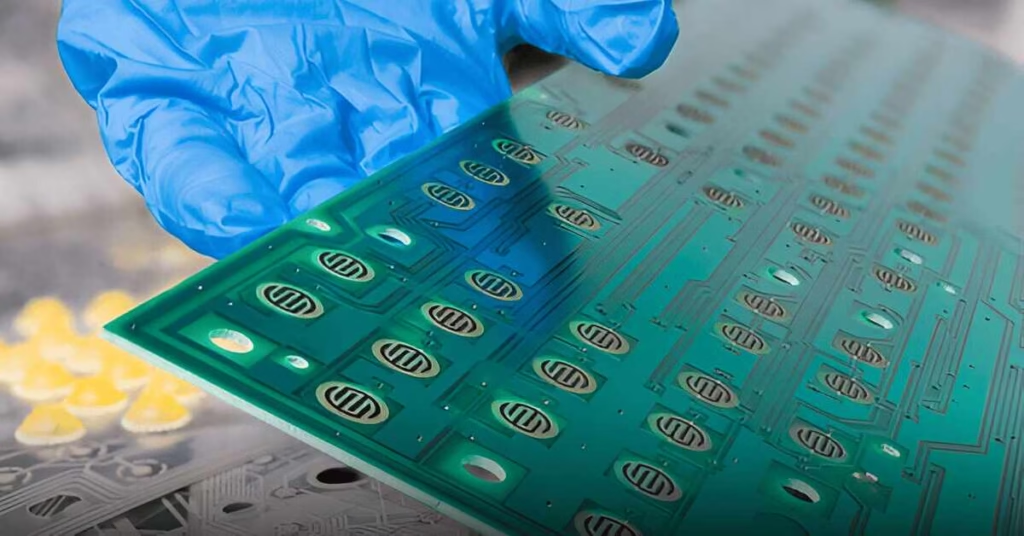
Membrane keyboards utilize a three-layer design with rubber domes instead of individual switches. Keystrokes rely on pressure to compress the membranes, which then complete an electrical circuit to register a keypress.
Characteristics of Membrane Keyboards
- Soft and Quiet Keystrokes for minimal noise.
- Low-Cost Manufacturing: Affordable production results in low market prices.
- Compact and Lightweight Designs.
Popular Usage Scenarios
Membrane keyboards dominate office spaces and budget-focused setups due to their silent operation and portability.
A Brief History
Introduced in the late 1980s, membrane keyboards became ubiquitous in workplaces because of their affordability and ease of manufacturing compared to mechanical models.
Why People Like It:
- Very quiet — ideal for shared workspaces.
- Affordable — great for students or budget-conscious users.
- Lightweight and easy to carry.
Popular Membrane Keyboard Products:
- 🔗 Logitech K120 Wired Keyboard – Reliable, simple, and budget-friendly.
- 🔗 Razer Cynosa V2 – A high-end membrane option with RGB lighting.
Side-by-Side Comparison: Mechanical vs Membrane
| Feature | Mechanical Keyboard | Membrane Keyboard |
| Typing Feel | Tactile, responsive, solid | Soft, quiet, mushy |
| Lifespan | 50–100 million keystrokes | 5–10 million keystrokes |
| Noise Level | Medium to loud (depends on switch) | Quiet |
| Price | Mid to high | Low to mid |
| Customization | High | Low |
| Gaming Performance | Excellent | Basic |
| Cleaning | Easy (removable keycaps) | Harder to clean |
| Weight | Heavier | Lighter |
Mechanical vs. Membrane Keyboard: A Detailed Comparison
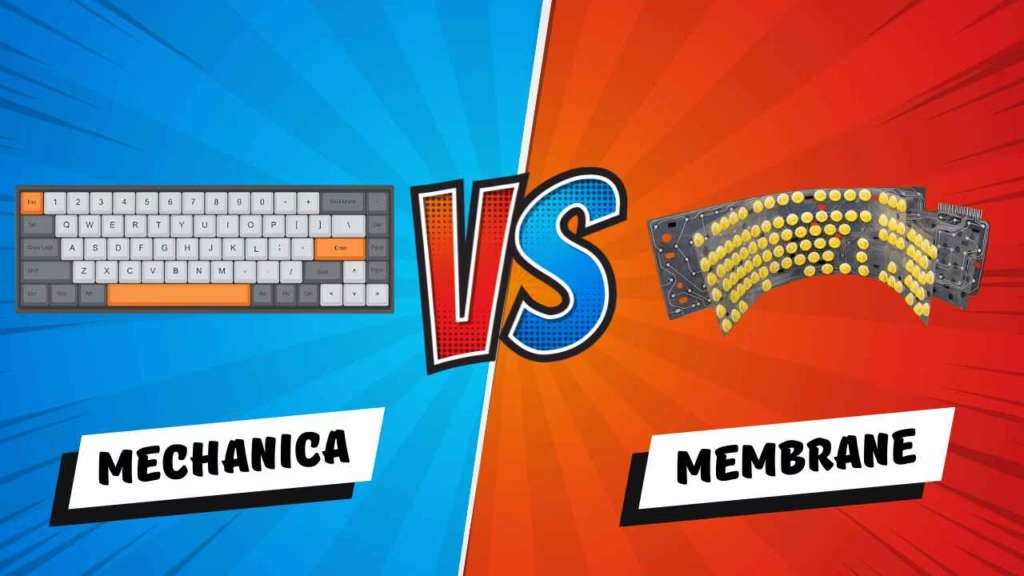
Typing Experience
- Mechanical Keyboards: Offer a comfortable and precise typing experience thanks to the tactile feedback of switches. Ideal for extensive typing sessions or gamers needing precision.
- Membrane Keyboards: Provide minimal tactile feedback, requiring greater finger force over time, which can make long sessions less comfortable.
Durability and Lifespan
- Mechanical Keyboards: Built to last up to 50+ million keystrokes per key. Highly durable, making them suitable for heavy daily use.
- Membrane Keyboards: Shorter lifespan (5–10 million keystrokes). Wear and tear can occur much sooner.
Noise Levels: Quiet or Clicky?
| Switch Type | Noise Level | Best For |
| Mechanical (Blue) | Loud | Typing, private use |
| Mechanical (Brown) | Medium | Office, mixed use |
| Mechanical (Red) | Quiet | Gaming, shared space |
| Membrane | Very quiet | Office, home, study |
Pro tip: Want a quiet mechanical keyboard? Try silent switches like Cherry MX Silent Red.
Ergonomics and Comfort
Both keyboard types can be comfortable if designed well. Look for:
- A proper tilt angle
- Wrist rest support
- Good key spacing
Mechanical keyboards tend to be taller, so a wrist rest helps. Membrane keyboards are lower profile.
🔗 Ergonomic Pick: Kinesis Freestyle Edge RGB – Split mechanical keyboard for better posture.
Cleaning and Maintenance
- Mechanical: Easier to clean. Just pop off the keycaps.
- Membrane: Harder to open, prone to dust and spills.
Mechanical keyboards are the better choice for long-term hygiene and upkeep.
Price and Affordability
- Mechanical Keyboards: Entry-level models start from $50, while premium options can exceed $300.
- Membrane Keyboards: Budget-friendly, with models often under $20, making them accessible for casual users.
Customization and Personalization
- Mechanical Keyboards: Highly customizable with swappable keycaps, programmable RGB lighting, and even custom switch builds.
- Membrane Keyboards: Limited customization options due to their fixed design.
Portability and Weight
- Mechanical Keyboards: Bulkier and heavier, less suitable for travel.
- Membrane Keyboards: Lightweight and easy to pack away, perfect for on-the-go use.
Environmental Impact
Mechanical keyboards last longer, meaning fewer end up in landfills. They’re often easier to repair and upgrade.
Membrane keyboards wear out faster and usually can’t be fixed. They’re cheaper, but you’ll likely replace them more often.
Pros and Cons of Mechanical Keyboards
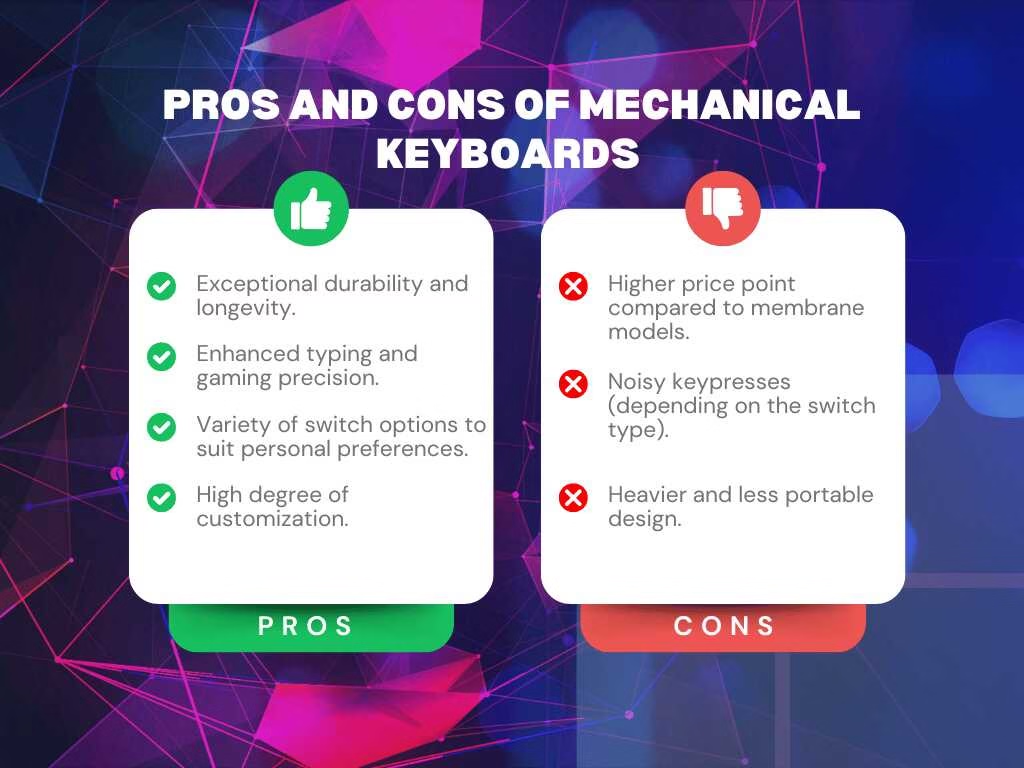
Pros
- Exceptional durability and longevity.
- Enhanced typing and gaming precision.
- Variety of switch options to suit personal preferences.
- High degree of customization.
Cons
- Higher price point compared to membrane models.
- Noisy keypresses (depending on the switch type).
- Heavier and less portable design.
Pros and Cons of Membrane Keyboards
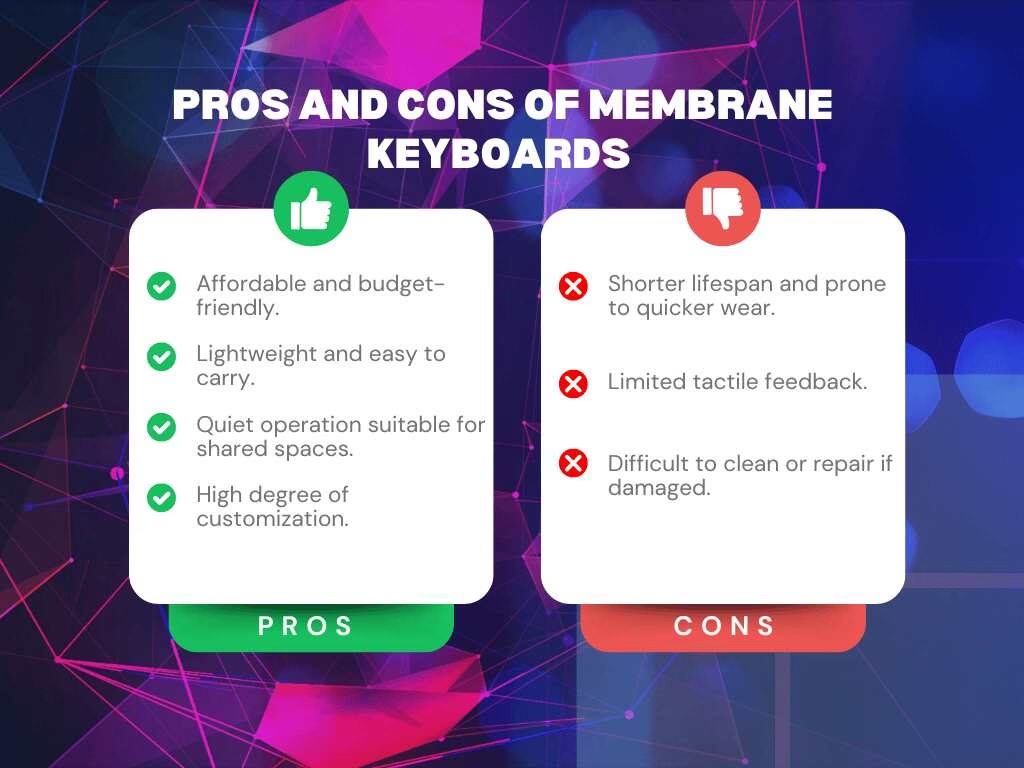
Pros
- Affordable and budget-friendly.
- Lightweight and easy to carry.
- Quiet operation suitable for shared spaces.
Cons
- Shorter lifespan and prone to quicker wear.
- Limited tactile feedback.
- Difficult to clean or repair if damaged.
Mechanical vs. Membrane Keyboards for Different Users

For Gamers
Competitive gamers favor mechanical keyboards for their superior responsiveness, lower input latency, and N-Key rollover. If you’re gaming casually, though, a membrane keyboard might suffice.
For Office Work
Quiet operation is key in workplace settings, making membrane keyboards or silent mechanical keyboards excellent options. Ergonomics should also play a role in your decision.
For Casual Users and Students
Membrane keyboards are an affordable choice with the simplicity needed for everyday use. Students may benefit from their portability and lightweight design.
For Programmers and Writers
Mechanical keyboards with tactile switches (e.g., Cherry MX Brown) excel for long typing sessions, offering comfort and accuracy for coders and writers.
Top Picks Based on Your Needs
| Use Case | Best Choice | Product Link |
| Fast Typing | Mechanical (Brown/Blue switches) | 🔗 Keychron K8 |
| Competitive Gaming | Mechanical (Red switches) | 🔗 SteelSeries Apex Pro |
| Quiet Office Work | Membrane or Silent Mechanical | 🔗 Logitech K120 |
| Budget Setup | Membrane | 🔗 Razer Cynosa V2 |
| Student Work | Membrane or Low-profile Mechanical | 🔗 Keychron K6 |
| Ergonomic Setup | Mechanical Split Keyboard | 🔗 Kinesis Freestyle Edge RGB |
Frequently Asked Questions (FAQ)
1. Which is better for gaming: mechanical or membrane?
Mechanical keyboards are better for gaming because they offer faster response times, better durability, and anti-ghosting features. Most pro gamers use mechanical keyboards for a competitive edge.
2. Are mechanical keyboards too loud for office use?
Some mechanical keyboards can be loud, especially those with Blue switches. For quieter typing, go for Red, Brown, or Silent switches—or use O-rings to reduce noise.
3. Why are mechanical keyboards more expensive?
They use higher-quality materials like metal springs and individual switches for each key. This makes them more durable and customizable, which adds to the cost.
4. Can I use a mechanical keyboard with my laptop?
Yes! Most mechanical keyboards connect via USB or Bluetooth and work perfectly with laptops. Just check for compatibility with your operating system (Windows, macOS, etc.).
5. Do membrane keyboards last long?
Not as long as mechanical keyboards. Membrane models usually last for 5–10 million keystrokes, while mechanical switches can last 50–100 million.
6. Is a mechanical keyboard better for typing?
For many people—especially writers, programmers, and students—yes. Mechanical keyboards offer tactile feedback that helps reduce typing errors and increase speed.
7. Can I clean my keyboard easily?
Mechanical keyboards are easier to clean. You can remove the keycaps to access dust and debris. Membrane keyboards are harder to open and clean thoroughly.
8. Are mechanical keyboards heavy to carry?
They tend to be heavier due to solid materials. If portability is important, look for compact 60% or 75% mechanical keyboards that are lighter and travel-friendly.
9. Do mechanical keyboards need software to work?
Basic typing works without software. However, advanced features like RGB lighting or macros might need software (e.g., SteelSeries Engine, Razer Synapse).
10. What’s the best keyboard under $50?
- Mechanical: Redragon K552 – great value for gamers.
- Membrane: Logitech K120 – simple, durable, and very affordable.
11. Are mechanical keyboards really better than membrane keyboards?
Mechanical keyboards tend to offer better durability, customization, and precision, while membrane keyboards are more affordable and quieter.
12. Do membrane keyboards wear out faster?
Yes, membrane keyboards have a shorter lifespan, often lasting only 5–10 million keystrokes.
13. Which one is better for gaming?
For competitive gaming, mechanical keyboards are the go-to option due to their responsiveness and durability. Casual gamers can use either type.
14. Can a membrane keyboard be good for typing?
While great for light typing, frequent typists may find membrane keyboards less comfortable compared to mechanical options.
15. How long do mechanical keyboards last compared to membrane keyboards?
Mechanical keyboards typically last 50+ million keystrokes, while membrane keyboards last only 5–10 million keystrokes.
Final Verdict: Which Keyboard Should You Choose?
When it comes to mechanical vs membrane keyboards, there’s truly no one-size-fits-all answer. Both types bring unique strengths to the table, and the best choice largely depends on your individual needs, preferences, and usage habits.
Mechanical keyboards are ideal for those who demand performance, precision, and long-term reliability. Whether you are a competitive gamer needing quick response times, a programmer typing thousands of lines of code daily, or a professional writer who values a satisfying tactile experience, a mechanical keyboard can significantly enhance your workflow and comfort. Their durable construction, customizable options, and variety of switch types allow you to find the perfect match for your typing style. Although they come at a higher price point, their longevity and superior performance often make them a worthwhile investment for serious users.
On the other hand, membrane keyboards offer excellent value for money and a more subdued typing experience. They are a great choice for budget-conscious buyers, casual users, students, or office workers who prioritize quiet operation and portability over tactile feedback. Lightweight and affordable, membrane keyboards are perfect for basic tasks like browsing, document editing, and occasional gaming without breaking the bank. While they may not deliver the same durability or premium feel as mechanical keyboards, their convenience and simplicity make them highly popular for everyday use.
If you have the chance, the best approach is to try both types in real-world settings before making a decision. Hands-on experience will help you understand the differences in feel, responsiveness, and comfort. After all, a keyboard is a personal tool—choosing one that fits your specific needs can make a significant difference in your productivity, gaming performance, and overall satisfaction.
Ultimately, whether you choose a mechanical or a membrane keyboard, the right option is the one that complements your lifestyle, meets your budget, and enhances your daily computing experience.
Related Topics You Might Like
- 1. Best Wireless Keyboards for Gaming
Looking for a high-performance wireless keyboard to level up your gaming experience? Explore our expert recommendations for the best wireless gaming keyboards that deliver low latency, responsive keystrokes, and maximum comfort during intense gaming sessions. - 2. Top 10 Best Wireless Keyboards
From office work to casual use, finding the right wireless keyboard can make all the difference. Discover our carefully curated list of the top 10 wireless keyboards available today, featuring options that balance performance, battery life, design, and affordability. - 3. Best Wireless Mouse for Performance and Comfort
Your perfect wireless setup isn’t complete without the right mouse. Check out our detailed guide on the best wireless mice, offering top-tier precision, ergonomic designs, and impressive battery longevity for gamers, professionals, and everyday users. - 4. Logitech MX Keys Mini Review: A New Standard for Compact Keyboards
Discover why the Logitech MX Keys Mini is winning hearts worldwide. In this in-depth review, we dive into its minimalist design, exceptional typing feel, smart features like multi-device connectivity, and why it’s a top choice for professionals on the move. - 5. Logitech K270 Wireless Keyboard: Reliable Performance at an Affordable Price
Need a durable and affordable wireless keyboard for everyday tasks? Read our full review of the Logitech K270 to find out how this budget-friendly keyboard offers dependable performance, easy wireless connectivity, and long battery life—making it a favorite for home and office use. - 6. Reed more About Mechanical vs Membrane Keyboard
